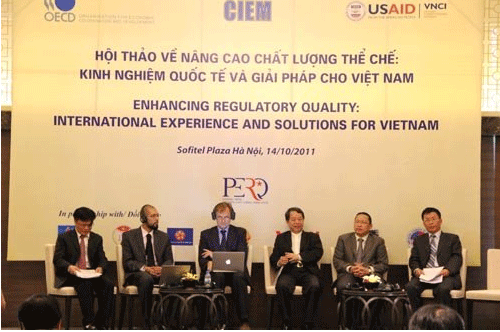International experts urge Vietnam to perform regulatory reform
The Vietnamese economy’s competitiveness can be raised if regulatory quality is improved. International experts worry that the increasing administrative burden will hold back Vietnam’s competitiveness.
This topic was lively discussed at a seminar on raising Vietnam's regulatory quality, held by the Central Institute for Economic Management (CIEM), Vietnam Competitiveness Initiatives (VNCI) project and the Organization for Economic Cooperation and Development (OECD) in Hanoi on October 14.

Regulatory reform is simply the improvement of quality of state policies and regulations, through which setting up a more favorable environment for citizens and businesses to develop and to make the economy more competitive and effective.
Institution knots
Vietnam’s regulatory environment has been rated poorly. Nguyen Manh Cuong, a permanent member of the National Assembly’s Committee for Justice, said the market economic institution, quality of human resources and poor infrastructure are knots that hinder Vietnam’s development.
One of the parameters of regulatory quality is the effectiveness of the State’s activities, consisting of quality of public service, the independence of public administration, quality of policy making and implementation and particularly the reliability of government’s commitments.
However, in comparison with 12 East Asian economies, the State effectiveness index of Vietnam ranks 10th, even behind Indonesia and the Philippines. The reason is Vietnam’s number of legal documents have quickly increased, while their quality is low.
Nguyen Tran Bat, Chairman and General Director of InvestConsult Group, said that all current documents shows the “ask-give” attitude.
Many experts said that a big barrier for regulatory reform is group interest. Policies and regulations are compiled by groups of experts and state officials who do not have any experience from the market and these policies may be compiled to benefit these people.
Nick Malyshev, head of OECD’s Policy and Institution Department, said before each policy and regulation is issued, it must be commented by the public because it can influence from housewives to the entire economy.
Pressure of reform
According to project 30 on administrative reform, a total of 5,421 procedures were checked and 8.8 percent of them were abandoned, 77 percent of were simplified, which can help businesses save $1.4 billion per annum.
But Dr. Scott Jacobs, expert of the Vietnam Competitiveness Initiatives project, believed that Vietnam needs to cut down further administrative formalities, like South Korea slashed 30-50 percent of procedures.
According to Jacobs, administrative procedures in Vietnam are a big burden and non-market but the number of such procedures is still on the rise, for example the issuance of regulations on milk price control, the ceiling price on apartment management fees or regulations on protection of local businesses in bidding of government’s projects. Such regulations will hinder businesses’ motive force to make renovation.
Annually, a large number of regulations which have impacts on businesses and people is issued. The total number of by-law documents issued in 2005-2008 is higher than that of the 18 years ago, averaging 860 documents per year. The number soared to nearly 1,500 new documents in 2009. During this time, nearly 2,560 documents in the form of dispatches, announcements and instruction were also issued annually. The figure doubled in 2009, with 5,467 documents.
Faisal Narul, chief advisor on regulatory reform of VNCI project, said that Vietnam’s competitiveness index in 2011-2012 falls by 6 grades over 2010-2011, ranking 65th out of 142 countries. Vietnam ranks 113th for burden of regulations, down by 14 grades over 2009. Vietnam’s transparency of policy-making process index also drops by 20 grades, to 73rd out of 133 countries. However, Vietnam is a developing country, so its potential of reform is huge in order to strengthen its competitiveness.
“A forest of regulations cause greater difficulties for management and improvement of institution quality of Vietnam,” said Dr. Nguyen Dinh Cung, CIEM’s deputy head.
“With a huge number of regulations, it is highly risky to have many bad regulations,” said Tran Huu Huynh, vice secretary general of the Vietnam Chamber of Commerce and Industry (VCCI).
VCCI’s Huynh explained that Vietnam has a “forest” of regulations because the government still over-intervenes in the market. When discussing a bill, the National Assembly often concentrates on discussion, not debate. In stead of discussing whether the bill is necessary or not, its target, how to implement it, National Assembly deputies often focus on words.
Nguyen Tran Bat, InvestConsult Group’s director, said management agencies are monopoly in drafting bills, as a result, the law-making attitude is to manage.
According to OECD, recent research works prove that the countries which perform widespread regulatory reform attain growth rate in ten years of 15 percent higher than those which do not carry out regulatory reform.
International experts said that regulatory reform is the long-term solution to deal with shortcomings of Vietnam’s economy. It is also appropriate with the Vietnamese government’s goal of restructuring the economy, changing the growth model and perfecting the market economy institution in the 2011-2015 period.
Vietnamnet/ Phuong Loan

